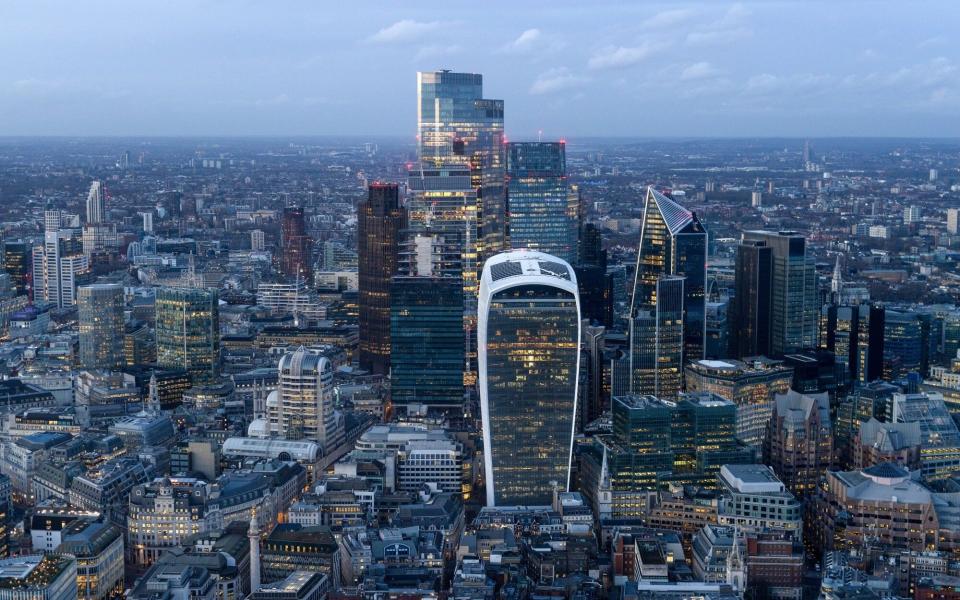Questor: The Wall Street bubble could soon burst – buy this trust to ride London’s rebirth

The London stock market is shrinking under an onslaught of investor indifference, corporate takeovers and companies buying back their shares. While that’s bad news for the country, there is money to be made by investors who are willing to go against the tide.
That’s the view of fund managers at Temple Bar, a £739m investment trust and Questor tip seeking to generate income and growth from buying good UK stocks when they are cheap.
The past four years have been difficult for funds like Temple Bar which invests largely in big London-listed companies. An exodus of investors into US and global funds helped drive UK stock valuations to 40pc below overseas shares.
This makes the task of Ian Lance and Nick Purves at RWC Partners easier, providing bargains in finance, consumer spending, communication and mining stocks.
The sting in the tail is what they call “valuation agnostic selling” by investors dumping good and bad UK companies alike in pursuit of more international portfolios.
“People are doing absolutely the wrong thing,” says Lance, who explains a low valuation is the foundation to good investment returns. In his view, that makes the UK more attractive than the US, despite the gulf in their performance since the financial crisis.

Over the past 15 years while the FTSE All-Share has returned an impressive 326pc, the US S&P 500 index has trounced the UK benchmark with a 1,019pc return in sterling. Following the recent “Magnificent Seven” tech stock advance, the US accounts for 71pc of the MSCI World index compared to the UK’s 3.8pc.
Lance believes this dominance cannot endure indefinitely. He refers to analysis by Hussman Strategic Advisers that shows at the end of 2023 the US stock market stood near a 95-year high when compared to the size of the American economy.
This suggests a Wall Street bubble could burst and a 12-year bear market ensue.
By contrast, the UK should do much better, says Lance, pointing to Temple Bar whose 31 stocks are valued at just eight times last year’s earnings compared to the US where stocks are valued at more than 20 times profits.
Private equity and corporate bidders have leaped into the void to snap up cheap FTSE companies. Acquisitions of these soared to 64 last year compared to an average annual tally of 40. Meanwhile just 23 companies floated.
This year is similar with Temple Bar seeing bids for its stakes in Currys, Direct Line, International Distribution Services (IDS), the owner of Royal Mail, and Anglo-American, the mining giant.
While they can drive up share prices, the managers dislike low-ball bids and objected to the approaches on Currys and IDS by US hedge fund manager Elliott and Czech businessman Daniel Kretinsky.
Lance, who has been a value investor for 35 years, says his job has become more difficult. “It used to be that other investors following you into a stock would help in its re-rating. That wall of money isn’t there now.”
Instead, the managers look for companies that can drive their own re-rating by buying back their shares when, as now, they are cheap. They cite Next, the high street fashion chain whose chief executive Lord Wolfson has delivered 16pc annualised shareholder returns this century by running the business well and buying back two thirds of its shares. It is no longer held by Temple Bar.
The theory behind buybacks is that by spreading a company’s profits over a smaller pool of stock, it improves earnings per share, which investors like.
Around half of Temple Bar’s assets are in eight profitable stocks that enhance returns with share buybacks. These include NatWest bank, which has bought back 29pc of its shares in the past two years, and BP and Shell which have both purchased 17pc.
The trust takes its own medicine too, having purchased 12pc of its shares since RWC, which trades as Redwheel, was appointed fund manager in October 2020.
“This is the catalyst – we think share prices are starting to respond,” says Lance, who hopes a combination of less stock and increased demand when investors see the improved results will revive the UK market.
Annual results last month showed the approach is working, with Temple Bar’s 12.3pc return beating the FTSE All-Share’s 7.9pc last year, helped by a doubling in the share price of Marks & Spencer. Since the managers were appointed the trust has delivered 86.7pc against the index’s 50pc.
Temple Bar’s performance suggests its managers are good at their jobs and we remain committed backers.
Questor says: buy
Ticker: TMPL
Share price at close: 257p
Gavin Lumsden is editor of Citywire’s Investment Trust Insider website
Read the latest Questor column on telegraph.co.uk every Sunday, Tuesday, Wednesday, Thursday and Friday from 5am.
Read Questor’s rules of investment before you follow our tips.


 Yahoo Finance
Yahoo Finance